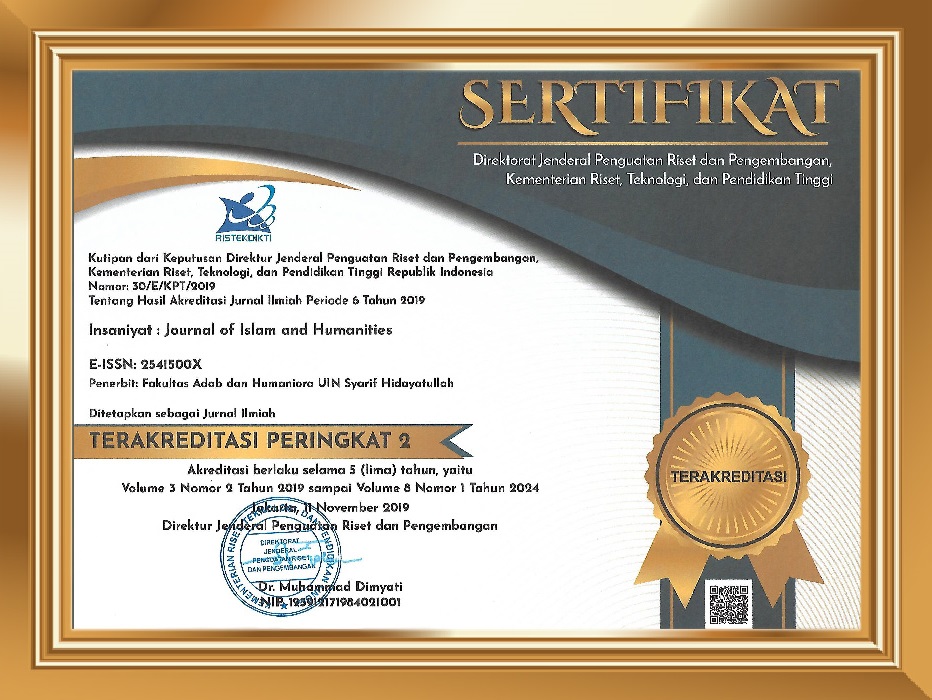Implicature Analysis of Adel Al-Jubeir Political Interview on Yemen Campaign
Abstract
Politicians use their political interviews to convey their thoughts towards their nations or others. This study aims to analyze conversation analysis and implicature of maxims being flouted by Adel Al-Jubeir regarding the Yemeni campaign, which started on 26th of March 2014. The study uses descriptive qualitative method. The data were institutional talk (Interview) conducted by Adel Al-Jubeir as IE (interviewee) and the journalist Wolf Blitzer as IR (interviewer) in the CNN channel in Washington. The data were analyzed according to Clayman and Heritage (2002) for conversation analysis and implicature of maxim based on Grice (1975). The results show two linguistic evidences. First, in institutional talks, conversation consists of three components, namely, opening, content, and closing. The opening includes the introduction, the content includes the announcement of the beginning of the campaign interface on Yemen and the Iranian nuclear program and its threat to Saudi Arabia, and the closing includes complete pairs (greetings). Second, for implicature analysis, the results show that Al-Jubeir being over-informative, stating more than required, represented with 82% of the quantity. He made a speech that he believed to be false, unjustified, and untruthful replies, representing 100% in the scale of quality. He gave irrelevant meaning to respond other participants’ utterances, representing 65% of maxim of relation. He gave unclear and indirect replies, representing 77% of maxim of manner. Besides, Al-Jubeir cooperated with IR. In addition, it can be summarized that he applied both particularized conversational and general implicature on political interview with some violation of the maxims as well.
Keywords
References
Abuczki, A., & Furko, A. (2014). English Discourse Markers in Mediatised Political Interviews. Brno Studies in English, 40(1), 45–64.
Aisya, N., & Fitrawati. (2019). An Analysis of Flouting of Maxim Performed by Politician Guests in Mata Najwa Talk Show in The Episode of Adu Lantang Jelang Penentuan and Babak Akhir Pilpres. E-Journal of English Language & Literature, 8(4), 43–55.
Al-Rassam, E. (2010). Analyzing Political Discourse: Towards a Pragmatic Approach. College of Basic Education Researchers Journal, 10(1), 528–538.
Baym, G. (2007). Crafting New Communicative Models in the Televisual
Sphere: Political interviews on The Daily Show. 10(2), 93–115. https://doi.org/10.1080/10714420701350379
Chilton, P. (2004). Analyzing Political Discourse: Theory and Practice. Routledge. Clayman, S., & Heritage, J. (2002). The News Interview: Journalists and Public Figures on the Air. Cambridge University Press.
DeLuca, K. M., & Peeples, J. (2002). From Public Sphere to Public Screen: Democracy, Activism, and the “violence” of Seattle. Critical Studies in Media Communication, 19, 125–151.
Dijk, V. (2005). War Rhetoric of A Little Ally Political Implicatures and Aznar’s Legitimatization of the War in Iraq. Journal of Language and Politics, 4(1), 65–91.
Fraser, B. (1999). What Are Discourse Markers? 31(7), 931–932. http://dx.doi.org/10.1016/S0378-2166(98)00101-5.
Grice, H. P. (1975). Logical and Conversation”. Syntax and Semantics, Speech Act, 3. Academic Press.
Grundy, P. (2000). Doing Pragmatics (Second Edition). UK.
Grundy, P. (2008). Doing Pragmatics (Third Edition). UK.
Hammodi, R. W., & Al-Duleimi, D. D. A. (2015). A Pragmatic Study of Strategic Maneuvering in Selected Political Interviews. Open Journal of Modern Linguistics, 5, 79–99.
Igwedibia, & Adaoma, E. (2016). Analyzing the Political Speeches of Obama on “Race and Economic Renewal in America” in the Light of the Theory of Conversational Implicature. Mediterranean Journal of Social Sciences MCSER Publishing, RomeItaly, 7(3), 253–262.
Jefferson, G. (2004). Glossary of Transcript Symbols with an Introduction. In G. H. Lerner (Ed). Conversation Analysis: Studies from the First Generation. John Benjamins.
Levinson, S. (1983). Pragmatics. Cambridge University Press.
Liddicoat, J. A. (2007). An Introduction to Conversation Analysis. Continum.
Nanda, S., Sukyadi, D., & Ihrom, S. M. (2012). Conversational Implicature of the Presenters in Take Me Out Indonesia. Indonesian Journal of Applied Linguistics, 1(2), 120–138.
Rahmi, S. S., Refnaldi, & Wahyuni, D. (2018). The Violation Of Conversational Maxims Found In Political Conversation At Rosi Talkshow. E-Journal of English Language & Literature, 7(1), 177–183.
Samsu, B. H. K., Amiri, E. R., & Fereidouni, G. H. (2011). He Hajj and Iran’s Foreign Policy Towards Saudi Arabi. Journal of Asian and African Studies, 46(6), 678–690.
Sanatifar, S. M. (2012). Implicature in Political Interview: A Translational Perspective. Translation Studies, 10(39), 40–52.
Sudaryanto, D. P. (2015). Metode dan Aneka Teknik Analisis Bahasa (Method and Technique of Language Study). Sanata Dharma University Press.
Tsojon, I. Y., & Jonah, P. K. (2016). An Analysis of the Pragmatic Implicatures of Selected Advert Billboards around Jos Metropolis in Terms of Grice (1975) Maxims of
Cooperative Principle. International Journal of English Language Teaching, 3(1). https://doi.org/10.5430/ijelt.v3n1p42
Vukovic, M. (2010). The Rhetorical Structure of Political Interview Closings. Journal of Linguistic Studies, 3(2), 69–78.
Yule, G. (1996). Pragmatics. Oxford University Press.
DOI: 10.15408/insaniyat.v5i1.15958
Refbacks
- There are currently no refbacks.






